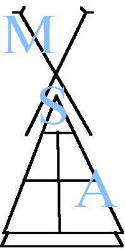 |
Page and all photography thereon © David A. Wiecking
Last updated 7/23/22; visited times. |
 |
 |

Considerable debate is held among the members of the MSA, but that and sliding disks is about all we do. We're not organized enough to be the Middlesex Shuffleboard Association, but are instead a loose alliance of reasonably dedicated shufflers. We meet each Memorial Day and Labor Day weekend at the corner of Dune and Addy Roads (between the McDonald's and the Atlantic).
We do, however, keep score. This causes us to endlessly debate which statistic is the truer measure of one's shuffling ability: scoring average or winning percentage. In other words: is the best shuffler the one who puts the most points on the board, or the one whose team wins the most games?
The MSA strongly favors the version of the game which pits two person teams against each other, as opposed to what is known as Walking Singles, in which 2 players walk from end to end in direct competition with each other.
The major advantage is the opportunity to be involved in a sporting event, but still be able to spend half of the game quaffing a brew and discussing strategy. The only known disadvantage is one's tendency to develop an unequal tan.Despite the continuing debate, after several years it had become the custom to rank individuals by scoring average. While competing in the Memorial Day 1996 tournament, one enterprising contestant proposed the worthiness of the "Power Factor" (scoring average times square root of the winning "percentage") as an overall determiner of individal shuffling ability. This ersatz stat is tracked to this day, lending it a false air of officialdom. Also tracked is "total points"; although it may be the ultimate measure of one's dedication to the cause, it should not be necessarily taken as an indicator of skill.
During the Memorial Day 1999 fiasco, scoring points was emphasized over anything else. Scant attention was paid to winning matches, but instead a peaceful, yet uneasy, coexistence developed among the players as opponents' discs were usually left untouched. After one match, it was the losers who continued playing because nobody cared enough to add the numbers properly.
Scoring Rules (thru Memorial Day 95): When the MSA was founded in 1991, games were played until one team attained a total score of 56 points (or until the point differential was at least 53 points, in order to end those +28 to -30 nightmares).
Scoring Rules (Labor Day 95 thru Memorial Day 99): The MSA then adopted the standard shuffleboard rule (recognized by the Alan R. Shuffleboard Society of Coral Gables, Florida) of playing a set number of ends, or innings. In order to win a tournament, a player had to participate in 5 games minimum. Over Labor Day 95 Charles Strickler took serious advantage of this rule by quickly winning 4 of 5 games with high point totals, then playing guitar for 2 days and watching the futile attempts of others to match his numbers. Once again, the MSA showed its flexibility by changing the rules to require that a tournament winner participate in 20% of the total games played.
Scoring Rules (Labor Day 99 thru present): Since continuing in the non-competitive manner would clearly be offensive to the true spirit of the founders of the MSA, an entirely different scoring system has been put into effect. If an inning ends 14-8 in favor of the yellow player, a score of 6-0 will be recorded. It is felt that recording scores in this manner will result in the highest scorer being the player who has outscored his opponent by the most. This scoring method rewards both fine offensive play, as well as fine defensive play. Outscoring one's opponent is the ultimate goal of the team game of shuffleboard, and it is this that we seek to glorify.
 |
Page and all photography thereon © David A. Wiecking
Last updated 7/23/22; visited times. |
 |
 |